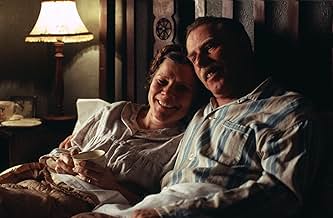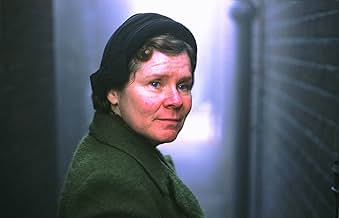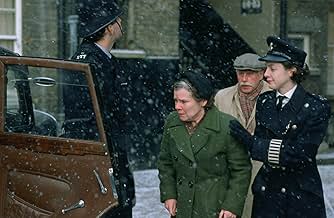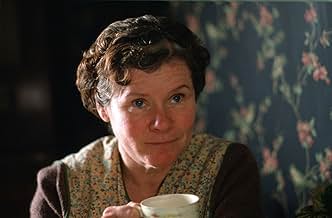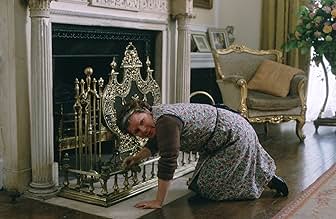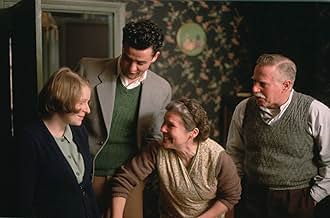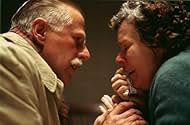CALIFICACIÓN DE IMDb
7.6/10
28 k
TU CALIFICACIÓN
Vera Drake considera que sus creencias y prácticas abortistas son contrarias a las costumbres de la Gran Bretaña de los años 50, un conflicto que conduce a la tragedia de su familia.Vera Drake considera que sus creencias y prácticas abortistas son contrarias a las costumbres de la Gran Bretaña de los años 50, un conflicto que conduce a la tragedia de su familia.Vera Drake considera que sus creencias y prácticas abortistas son contrarias a las costumbres de la Gran Bretaña de los años 50, un conflicto que conduce a la tragedia de su familia.
- Dirección
- Guionista
- Elenco
- Nominado a 3 premios Óscar
- 41 premios ganados y 45 nominaciones en total
Sinead Matthews
- Very Young Woman
- (as Sinéad Matthews)
- Dirección
- Guionista
- Todo el elenco y el equipo
- Producción, taquilla y más en IMDbPro
Opiniones destacadas
I have been a longtime fan of Mike Leigh, always fascinated to see his slice of life take on England. Because of his well known creative process, the intrigue would be to see the actors and the characters and dramas (and comedies) they created. They were always worth watching in a voyeuristic way due to Leigh's unobtrusive camera work.
Vera Drake is well worth seeing for these same reasons, but Leigh has made a bigger and better movie than ever before, even with all of Topsy Turvy's bombast. His ambitions as director are greater than ever. First of all, to take on the subject of abortion is very brave. But I'll leave that for others to discuss. What was of interest to me from the opening shot was that this was going to be a visual tour de force, and it was.
Painting the scenes in dark, crushing browns and greens, with tight camera angles or letting the light in, each scene had the feel of a well thought out canvas, even the cut aways between scenes were new, inventive and beautiful.
And the acting is great and the scenes of the family interacting in close quarters, moving in synch are so pitch perfect you feel they have been doing this for decades.
So if you're thinking of seeing this movie, sit back, relax, and prepare to be taken on a slow, masterful ride.
Vera Drake is well worth seeing for these same reasons, but Leigh has made a bigger and better movie than ever before, even with all of Topsy Turvy's bombast. His ambitions as director are greater than ever. First of all, to take on the subject of abortion is very brave. But I'll leave that for others to discuss. What was of interest to me from the opening shot was that this was going to be a visual tour de force, and it was.
Painting the scenes in dark, crushing browns and greens, with tight camera angles or letting the light in, each scene had the feel of a well thought out canvas, even the cut aways between scenes were new, inventive and beautiful.
And the acting is great and the scenes of the family interacting in close quarters, moving in synch are so pitch perfect you feel they have been doing this for decades.
So if you're thinking of seeing this movie, sit back, relax, and prepare to be taken on a slow, masterful ride.
I don't think I need to fear rolling pins being thrown in my general direction when I say that powerful women roles are few and far between in Moviedom. That is not to say that there aren't any, it's just that it is rare for a female performance to blow you away in any projector driven screening. This is due more to Hollywood's reluctance to create interesting and powerful roles for the female elite than the actresses' ability themselves. Where studio honchos salivate over the next Jack Nicholson powerhouse or Anthony Hopkins costume drama, there are far far too few Charlize Theron's Monster to counter.
However, leave it up to Mike Leigh to try and correct this trend. In 1996, he wrote and directed the wonderful Secrets & Lies, and his writing for the women leads was so strong, that the Academy awarded nominations for both Best Actress (Brenda Blethyn) and Supporting Actress (Marianne Jean-Baptiste). Now in 2004, Leigh has given us the strongest performance by a male or female of the year with Imelda Staunton as the title character in the new film Vera Drake.
Vera Drake is the story a family in 1950's London. Vera is the Motherhead and she is the jack-of-all-trades within the community. Her days are spend stopping in on elderly people to help them with their lunch, working a various estates as a cleaning lady, slaving at a light bulb producing factory and most notably, as a caring individual who helps young and poor women terminate unwanted pregnancies.
However, if you were to ask Vera Drake what her role was, she would probably admit to being a mother first a caregiver to her husband and two children.
A selfless woman who has little time for herself and therefore little time to digest the consequences of her illegal actions. Vera is goes about every bit of her business, whether she is down on her knees cleaning the brass around a fireplace or helping a woman perform an abortion without a frown and usually with a smile on her face, a whistling tune on her lips and the kettle on the stove.
Vera's family are equally lovable individuals. Her husband, Geroge (Phil Davis) works with his brother at an automobile repair shop. Her son Sid works as the local tailor and her daughter is a soft spoken lass who falls for a local man Vera invites over to dinner as a kind gesture. Together they make the quintessential family unit that we all envisioned 1950's households to encompass.
But when a local girl has a bad reaction to a Drake endorsed abortion, their world is turned on end. An investigation by the local police lead them to Vera's door on the night of celebration due to her daughters engagement. And as the police take Vera to the local booking station for a statement and sentencing, Imelda Staunton does her best work through the tears and expressions mirroring the suffering at the anguish she has put her family through.
Vera Drake might just be the best picture to be viewed by this critic this year. The characters are so robust and real that every time Vera put the kettle on for a cup of tea, you would think she is doing it for everyone in the audience. We become captivated by their lives and interested in the effects the events have on the family unit. The writing is crisp and you can imagine these people saying these things to one another a gift not often bestowed upon moviegoers in such a powerful form.
Director Mike Leigh deserves most of the credit. He transforms Vera in front of us and manages to take an illegal action that is generally taboo in conversation and shows us the innocent side of the argument where rich people pay large sums of money to go specialists, but the poor and equally needy require the services of a local underground network. As someone who sits on one side of the abortion issue, I was amazed at the conclusion of the film how non-preaching and argumentative the film ended up being. Vera goes about her business like a friend helping out someone in need. She deals not in the politics or the societal view of her task but rather as someone just doing what is best for those found in situations where this solution is the only viable option.
Leigh's writing and directing however are overshadowed by the incredible performance by Imelda Staunton. This maybe the first film that I can remember where a female should win an Academy Award for a role that didn't harbor any speeches into the camera or voice over dramatization of the situation. With that, I give Vera Drake a very strong recommendation.
www.gregsrants.com
However, leave it up to Mike Leigh to try and correct this trend. In 1996, he wrote and directed the wonderful Secrets & Lies, and his writing for the women leads was so strong, that the Academy awarded nominations for both Best Actress (Brenda Blethyn) and Supporting Actress (Marianne Jean-Baptiste). Now in 2004, Leigh has given us the strongest performance by a male or female of the year with Imelda Staunton as the title character in the new film Vera Drake.
Vera Drake is the story a family in 1950's London. Vera is the Motherhead and she is the jack-of-all-trades within the community. Her days are spend stopping in on elderly people to help them with their lunch, working a various estates as a cleaning lady, slaving at a light bulb producing factory and most notably, as a caring individual who helps young and poor women terminate unwanted pregnancies.
However, if you were to ask Vera Drake what her role was, she would probably admit to being a mother first a caregiver to her husband and two children.
A selfless woman who has little time for herself and therefore little time to digest the consequences of her illegal actions. Vera is goes about every bit of her business, whether she is down on her knees cleaning the brass around a fireplace or helping a woman perform an abortion without a frown and usually with a smile on her face, a whistling tune on her lips and the kettle on the stove.
Vera's family are equally lovable individuals. Her husband, Geroge (Phil Davis) works with his brother at an automobile repair shop. Her son Sid works as the local tailor and her daughter is a soft spoken lass who falls for a local man Vera invites over to dinner as a kind gesture. Together they make the quintessential family unit that we all envisioned 1950's households to encompass.
But when a local girl has a bad reaction to a Drake endorsed abortion, their world is turned on end. An investigation by the local police lead them to Vera's door on the night of celebration due to her daughters engagement. And as the police take Vera to the local booking station for a statement and sentencing, Imelda Staunton does her best work through the tears and expressions mirroring the suffering at the anguish she has put her family through.
Vera Drake might just be the best picture to be viewed by this critic this year. The characters are so robust and real that every time Vera put the kettle on for a cup of tea, you would think she is doing it for everyone in the audience. We become captivated by their lives and interested in the effects the events have on the family unit. The writing is crisp and you can imagine these people saying these things to one another a gift not often bestowed upon moviegoers in such a powerful form.
Director Mike Leigh deserves most of the credit. He transforms Vera in front of us and manages to take an illegal action that is generally taboo in conversation and shows us the innocent side of the argument where rich people pay large sums of money to go specialists, but the poor and equally needy require the services of a local underground network. As someone who sits on one side of the abortion issue, I was amazed at the conclusion of the film how non-preaching and argumentative the film ended up being. Vera goes about her business like a friend helping out someone in need. She deals not in the politics or the societal view of her task but rather as someone just doing what is best for those found in situations where this solution is the only viable option.
Leigh's writing and directing however are overshadowed by the incredible performance by Imelda Staunton. This maybe the first film that I can remember where a female should win an Academy Award for a role that didn't harbor any speeches into the camera or voice over dramatization of the situation. With that, I give Vera Drake a very strong recommendation.
www.gregsrants.com
"Vera Drake" makes us realize how few of the classic kitchen sink, working class dramas of post-war Britain, whether in film or theater, were from the viewpoint of women ("Georgy Girl" and "A Taste of Honey" were among the few). Oh, girlfriends got knocked up in those works, but they were always seen as manipulative strangleholds to the freedom of the Angry Young Men; they should just take care of it.
With exquisite attention to complete period detail in body language, coloring, clothes, physical surroundings, etc. that fill the screen as much as he did theatrically in re-creating "The Mikado" in "Topsy Turvy," Mike Leigh takes us to the other side of that doorway that the older movies rarely showed us, (though in the '60's the original "Alfie" and the schmaltzier Hollywood "Love with the Proper Stranger" gave us an exaggerated view). The film also works in tandem with Peter Mullan's "The Magdalene Sisters" in showing how cruel life in Ireland and Britain could be for women with unwanted pregnancies, though evidently this film is not a docudrama.
This complete mise en scene (including contrasts with the upper crust families she works for as a domestic) very gradually gives us the matter of fact quotidian of Drake's mundane life of caring for her family and the neighborhood unfortunates, including girls she "helps out."
Imelda Staunton's self-effacement into the role and her character's into her environment doesn't prepare us for how she comes to completely overwhelm us.
Leigh created a similar working class world in "All of Nothing," but that film had no trajectory, virtually nothing happened to those characters, and none of the characters were as completely sympathetic as naive Drake is. It is wonderful to see a character actress get to fill the screen for long, emotional close-ups. The audience in the almost sold out theater I was in was completely gripped in silence and holding their breath as her life played out. Too bad the hot subject matter of abortion will probably keep her from getting an Academy Award.
Because of the vivid realism in the film, it is frustrating that there is no factual information provided, for example, as to when abortions became legally available to all women in Britain. A few facts are thrown out about enforcement and consequences, but those are anecdotal, though the class differences are portrayed vividly.
One is left with complete sadness that for all the specificity of time and place in the film, we could easily go back to a time like this when abortions are illegal and unsafe, because there will always be women who feel that is their only option, whether single, married, poor or rich. The past is prologue to the future.
With exquisite attention to complete period detail in body language, coloring, clothes, physical surroundings, etc. that fill the screen as much as he did theatrically in re-creating "The Mikado" in "Topsy Turvy," Mike Leigh takes us to the other side of that doorway that the older movies rarely showed us, (though in the '60's the original "Alfie" and the schmaltzier Hollywood "Love with the Proper Stranger" gave us an exaggerated view). The film also works in tandem with Peter Mullan's "The Magdalene Sisters" in showing how cruel life in Ireland and Britain could be for women with unwanted pregnancies, though evidently this film is not a docudrama.
This complete mise en scene (including contrasts with the upper crust families she works for as a domestic) very gradually gives us the matter of fact quotidian of Drake's mundane life of caring for her family and the neighborhood unfortunates, including girls she "helps out."
Imelda Staunton's self-effacement into the role and her character's into her environment doesn't prepare us for how she comes to completely overwhelm us.
Leigh created a similar working class world in "All of Nothing," but that film had no trajectory, virtually nothing happened to those characters, and none of the characters were as completely sympathetic as naive Drake is. It is wonderful to see a character actress get to fill the screen for long, emotional close-ups. The audience in the almost sold out theater I was in was completely gripped in silence and holding their breath as her life played out. Too bad the hot subject matter of abortion will probably keep her from getting an Academy Award.
Because of the vivid realism in the film, it is frustrating that there is no factual information provided, for example, as to when abortions became legally available to all women in Britain. A few facts are thrown out about enforcement and consequences, but those are anecdotal, though the class differences are portrayed vividly.
One is left with complete sadness that for all the specificity of time and place in the film, we could easily go back to a time like this when abortions are illegal and unsafe, because there will always be women who feel that is their only option, whether single, married, poor or rich. The past is prologue to the future.
In the early 1950's, Britain is still very much recovering from the war years and the working classes are very much held together by salt-of-the-earth types supporting their families and others. One such woman is Vera Drake; mother, wife, carer, cleaner and part-time back-street abortionist. Vera takes no money for her work and simply wishes to give them the help that they cannot afford to get through legitimate channels. However not everyone shares her view of abortion and it is only a matter of time before Vera's work comes to the attention of the authorities.
Bearing in mind that this film being mentioned in the Oscars, Baftas and general glowing support of critics, it is easy to forget that it raced through the UK's multiplexes so quickly that I had to wedge myself into a sold-out art-house cinema just to see it (sold out, that is, on an afternoon screening). It is even easier to forget that fewer than 1000 people have even voted for this title as I write this review. Certainly watching it yesterday it is easy to understand why it is feted by critics but not the choice of thousands of teenagers for a Saturday night at the movies, because it is a very slow, difficult film that is far from being a bundle of laughs. However it is still a fascinating film throughout even if it is not as strong as could have been expected. The story is basic and it can't quite fill the time, maybe down to the way it was written that is, it was written as a frame and the dialogue was improvised and workshopped rather than scripted in the traditional fashion (hence Leigh's surprise at one of his Oscar nominations!).
While this weakens the story a little, it seems to have produced great performances from the cast that do more than cover for the slow pace. Staunton is superb and she stands out in the best actress category. She is a complex character that the film never easily pigeonholes and it shows how balanced the film is in the way we are not swayed in her favour by her character whenever her morals come under fire. The film is very much hers and she is totally convincing in her character. She is well supported by natural performances from Graham, Davis, Marsan and Mays among others. Leigh's direction is very intimate and, with sets and costumes, he has painted a convincingly downbeat view of post-war Britain that looks good and adds to the realistic feel of the film.
The film had a lot less debate than I had expected and it doesn't really come down on either side of the abortion issue; I guess that it is better that it leaves it to us to think over rather than preaching to us how nice (and unusual) to be treated like adults by a film. Overall though, it is the story and Vera herself that make the film so involving, the story is well framed and the workshop approach has produced some very good performances, particularly from Staunton, who outshines all others nominated alongside her in the Oscars. Deserves to be seen by larger audiences than it has had thus far, but just don't expect it to be fast-paced, fun or gripping it is much more than that.
Bearing in mind that this film being mentioned in the Oscars, Baftas and general glowing support of critics, it is easy to forget that it raced through the UK's multiplexes so quickly that I had to wedge myself into a sold-out art-house cinema just to see it (sold out, that is, on an afternoon screening). It is even easier to forget that fewer than 1000 people have even voted for this title as I write this review. Certainly watching it yesterday it is easy to understand why it is feted by critics but not the choice of thousands of teenagers for a Saturday night at the movies, because it is a very slow, difficult film that is far from being a bundle of laughs. However it is still a fascinating film throughout even if it is not as strong as could have been expected. The story is basic and it can't quite fill the time, maybe down to the way it was written that is, it was written as a frame and the dialogue was improvised and workshopped rather than scripted in the traditional fashion (hence Leigh's surprise at one of his Oscar nominations!).
While this weakens the story a little, it seems to have produced great performances from the cast that do more than cover for the slow pace. Staunton is superb and she stands out in the best actress category. She is a complex character that the film never easily pigeonholes and it shows how balanced the film is in the way we are not swayed in her favour by her character whenever her morals come under fire. The film is very much hers and she is totally convincing in her character. She is well supported by natural performances from Graham, Davis, Marsan and Mays among others. Leigh's direction is very intimate and, with sets and costumes, he has painted a convincingly downbeat view of post-war Britain that looks good and adds to the realistic feel of the film.
The film had a lot less debate than I had expected and it doesn't really come down on either side of the abortion issue; I guess that it is better that it leaves it to us to think over rather than preaching to us how nice (and unusual) to be treated like adults by a film. Overall though, it is the story and Vera herself that make the film so involving, the story is well framed and the workshop approach has produced some very good performances, particularly from Staunton, who outshines all others nominated alongside her in the Oscars. Deserves to be seen by larger audiences than it has had thus far, but just don't expect it to be fast-paced, fun or gripping it is much more than that.
Mike Leigh has done it again. I adore "Secrets and Lies", my 2nd favorite film of all time and Leigh strikes gold again in the emotionally draining, brilliantly directed study of a 50's era abortionist in London. Imelda Staunton gives, yet another in Leigh's film, outstandingly powerful and true performance as Vera Drake. She a inner-city housewife and mother, who spends much of her free time trying to "help out" the poor ladies of 50's London who are unable to get legal abortions. Some may consider this a hot-topic issue film, but it's moreover an independent study of a woman and her life, and how her emotions play in her world. Every nuance of this film is perfectly crafted, from every performance, to the sets, and the cinematography. The emotions overflow steadily, especially after the traumatic dinner scene where the police arrive for Vera. The look of horror that Staunton displays and changes as she realizes what is happening is acting and direction at it's best. Why is it American films aren't able to capture this from it's performers? I can't praise this film enough and truly believe that this will be my favorite film of the year. It's a shame this film got only a small release and audiences seemed unmoved by it. I don't understand it. Hopefully DVD will allow those who missed it to catch up with it and relish in it's brilliance. It will be a rewarding experience for all to see. I am praying for Oscar noms all around, but especially for Staunton. It is clearly and without any doubt, the best female performance as of this date, this year.
¿Sabías que…?
- TriviaExcept for Imelda Staunton, none of the actors knew the film was about abortion until their characters found out.
- ErroresVera's sister-in-law Joyce says she wants a washing machine which costs "25 pounds." Until decimalization in 1971, most luxury goods, like washing machines and men's suits, were priced in guineas, not pounds (one guinea = one pound one shilling, or one pound five pence in decimal). Some stores, particularly those wishing to appeal to the middle class or aspiring to a degree of 'poshness', priced items in pounds. Throughout the 1960s most domestic items were priced in pounds, shillings, and pence. Services and professions continued to charge in guineas until much later. In the film, an abortion costs two guineas.
- Bandas sonorasSalut D'Amour (Liebesgruss), Op.12
(1888)
Written by Edward Elgar
By permission of Schott & Co Limited, London
Performed by Rosemary Warren-Green (violin) and Ian Brown (piano)
Selecciones populares
Inicia sesión para calificar y agrega a la lista de videos para obtener recomendaciones personalizadas
- How long is Vera Drake?Con tecnología de Alexa
Detalles
- Fecha de lanzamiento
- Países de origen
- Idioma
- También se conoce como
- Vera Drake
- Locaciones de filmación
- Productoras
- Ver más créditos de la compañía en IMDbPro
Taquilla
- Presupuesto
- USD 11,000,000 (estimado)
- Total en EE. UU. y Canadá
- USD 3,775,283
- Fin de semana de estreno en EE. UU. y Canadá
- USD 13,207
- 10 oct 2004
- Total a nivel mundial
- USD 13,267,869
- Tiempo de ejecución2 horas 5 minutos
- Color
- Mezcla de sonido
- Relación de aspecto
- 1.85 : 1
Contribuir a esta página
Sugiere una edición o agrega el contenido que falta

Principales brechas de datos
By what name was El secreto de Vera Drake (2004) officially released in India in English?
Responda

